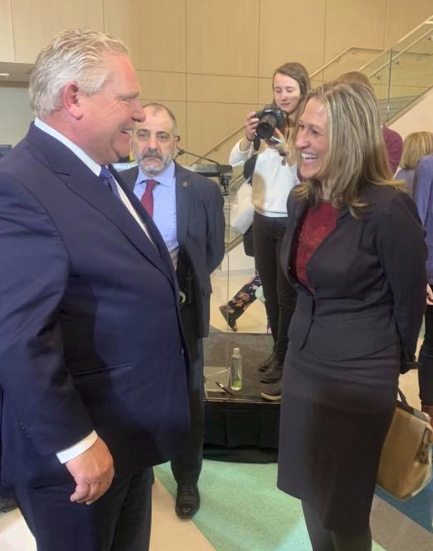 By Staff
By Staff
July 27th, 2020
BURLINGTON, ON
Mayor Marianne Meed Ward passed along some “ great news today when the province announced $4 billion in funding for cities for COVID19-related revenue loss and added costs. The amount includes $2 billion for transit, half from the federal government, match by half from the province.”

Mayor Marianne Meed Ward with Premier Doug Ford at a Joseph Brant Hospital event.
“This is our tax dollars coming back to our community”, said the Mayor. “These funds will help municipalities avoid service cuts, unreasonable tax increases, or depleting reserves beyond sustainable levels. Our advocacy worked, and our voices were heard.
Let’s wait until the budget is final before taking that statement at face value. Burlington will get a portion of that $4 billion. The Mayor said she “ expects funding to begin to flow in coming weeks.
The funding is a partnership with the federal government for urgently needed one-time assistance to Ontario’s 444 municipalities. This funding will help local governments maintain the critical services people rely on every day, including public transit, over the next six to eight months.
Premier Ford worked collaboratively with municipal partners, fellow Premiers, Prime Minister Trudeau and Deputy Prime Minister Freeland to reach this historic agreement, which includes $777 million from the federal government and $1.22 billion from the province in support for municipalities. Ontario will continue to work closely with its municipal partners to ensure this funding provides the support they need to address budget shortfalls related to COVID-19.
“Ontario municipalities told us they are dealing with a $4 billion shortfall as a result of COVID-19,” said Minister Phillips. “Failing to act could result in cuts to services and higher taxes. That’s why, under Premier Ford’s leadership, Ontario was a strong advocate at the negotiating table to ensure municipalities and transit systems were supported as part of the Safe Restart Agreement. This is a historic level of support that’s being provided during unprecedented times.”
Through Ontario’s leadership, a deal for public transit funding was also secured as part of the federal-provincial agreement. Up to $2 billion will be shared equally between Ontario and the federal government. Transit operators that have seen steep declines in revenues will receive the support they need to help address the financial impacts of COVID-19 and continue their operations in a safe manner.
The Safe Restart Agreement will help ensure a strong and safe recovery for Ontario through investments in testing, contact tracing and data management; health care capacity and mental health; protecting vulnerable populations, including people experiencing homelessness and seniors in long-term care facilities; securing personal protective equipment (PPE); child care for returning workers; and support for municipalities and public transit systems.




















Philip.
You hit the nail on the head. This spending will prevent unreasonal property tax increases But unreasonable Provincial and Federal tax increases await us and the future generations of young folks. It all comes from the same taxpayers. 70 and 80 year olds can let others pay their bills. Cutting spending is what make sense. Not with this Mayor or Prime Minister.
I think we have entered a new reality. The costs of this pandemic have overwhelmingly been shouldered by the private sector–layoffs, reduced wages, business closures and bankruptcies, increased private debt. Governments and their employees have largely been sheltered from the worst economic impacts of this pandemic; even before the pandemic, public sector workers were enjoying higher wages, benefits, and pensions than their private sector counterparts. In this environment, governments have no moral authority to go to workers in the private sector and raise their taxes further depressing their standard of living in order to maintain the incomes and benefits of workers in the public sector. It is clearly time for governments of all stripes, including the current free spenders on Brant Street, to start reducing their spending–we no longer can afford the virtue-signalling of a tree bylaw, or a sidewalk that isn’t needed. At the very least governments must aim for a zero percent tax increase. Remember the mantra mouthed by governments–“we are all in this together” or are we?
It is not really “borrowed”, it is using income tax/commodity tax revenue to pay for services which is what tax revenue is supposed to do. If the provincial and federal governments did not step in, the shortfall for all of these expenses would have to come out of the local property tax base and immediately, as municipalities can’t run deficits. This spreads out the costs of increased emergency services – which are delivered and paid for at the local level – and decreased non-tax revenue (e.g. licenses and recreation fees) geographically and over time. It makes sense.
Yes it is really borrowed. Both provincial and federal governments are running massive deficits so when they fund the municipalities, it is not coming out of some pot of tax money they had carefully squirreled away, it is being borrowed. The only tax revenue involved will be the taxes that your kids and grandkids end up paying to finance all the borrowing.
“This is our tax dollars coming back to our community”???? Unbelieveable–is this how the Mayor understands public finance? Alll the money that the City is receiving from the province and federal government is BORROWED money. Instead of the City owing the money, the province and federal government are now deeper in debt.
I’d be interested to hear your ideas on what we would do without that money. Whether borrowed or not, communities need it to maintain services. Which services would you cut? Police? Garbage collection? Roads? Transit? How much money do you think the city can save by repealing a tree bylaw or not building a sidewalk? Do you even know how much the city would have to cut to replace the fed/prov money? In the end, your cuts would do more damage to the economy than government debt financed at historically low interest rates. By the way, “70 and 80 year olds” also pay taxes and have been doing so for 50-60 years. They are at least as deserving of help as anyone else.